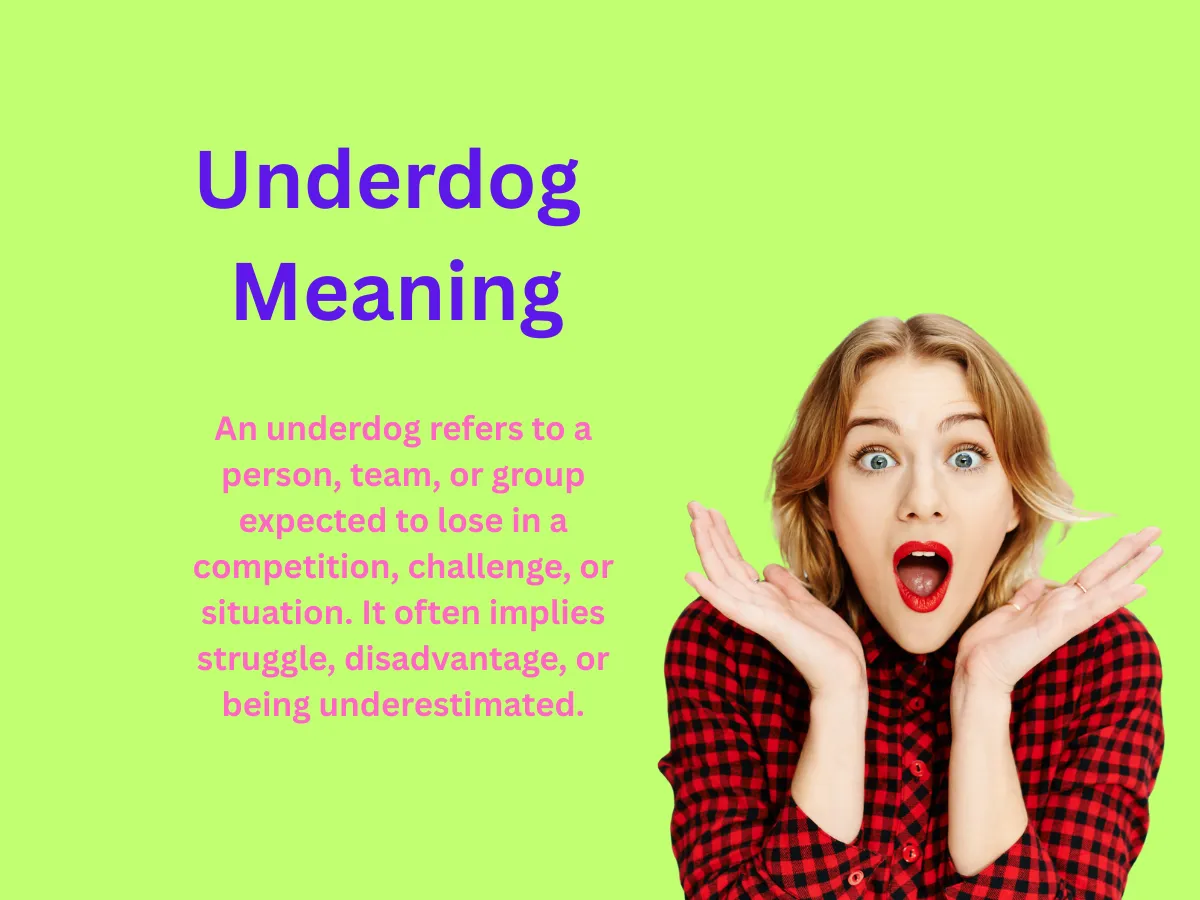Underdog means a person, team, or group that is expected to lose or face disadvantages in a competition or challenge. Underdog Meaning captures the spirit of every fighter who turns doubt into destiny and struggle into success.
The term is often used in sports, competitions, and Gen Z to describe someone fighting against the odds.
An underdog can evoke sympathy, support, or inspiration, especially when they outperform expectations.
In this guide, we’ll explain the meaning of underdog, explore its origins, provide real-life example sentences, discuss its use in slang and figurative speech, and share synonyms and related expressions.
What Does Underdog Mean in Slang?
An underdog is someone expected to lose or face challenges against stronger opponents. While the term is common in sports or contests, it is also used metaphorically for anyone confronting difficult odds in work, school, or life situations.
Example Sentences:
- “The small startup was the underdog, but it eventually outperformed its competitors.”
- “Everyone cheered for the underdog team, hoping for a surprising victory.”
- “He felt like the underdog in the debate, but he gave it his all.”
Key Points to Remember:
- Underdog usually implies disadvantage or low expectations.
- Often evokes sympathy, admiration, or inspiration.
- In slang or casual speech, it can describe anyone defying odds.
Background & History
The term “underdog” originated in the 19th century, used to describe the dog that lost in a fight. Over time, it evolved into a metaphor for anyone struggling against stronger opponents.
As society embraced the idea of rooting for those who defy the odds, the underdog became a symbol of hope, perseverance, and rebellion against expectations. Popular films, sports stories, and motivational speeches have kept the term alive as a badge of courage.
Usage in Various Contexts
1. Texting
Used to encourage or inspire someone.
A: “Do you think I can still win?”
B: “Of course! You’re the underdog—they never see it coming 💪”
2. Social Media
Often used in captions, hashtags, or motivational posts.
“#UnderdogEnergy — turning every ‘no’ into a comeback story 🔥”
3. Gaming
Describes players who face stronger opponents but still fight hard.
Player 1: “We’re losing badly.”
Player 2: “Relax, we’re the underdogs. That’s our power!”
4. Daily Conversations
Used to show support or admiration.
“I love how she started with nothing and made it—true underdog vibes.”
5. Professional Settings
Used positively to describe a small company or individual succeeding unexpectedly.
“Our startup is the underdog of the tech world—but we’re growing fast.”
Common Misconceptions & Clarifications
- 1: Underdogs always lose.
Reality: Many underdogs win precisely because they’re avid in nature. - 2: The term only applies to sports.
Reality: It’s used across business, entertainment, politics, and everyday life. - 3: Being an underdog means being weak.
Reality: It represents hidden strength, persistence, and the will to fight back.
Similar Terms & Alternatives
| Term | Meaning | Example |
|---|---|---|
| Dark Horse | Someone who surprises everyone with success | “That dark horse candidate won the whole race.” |
| Comeback Kid | A person who recovers from failure | “She’s the comeback kid of this season.” |
| Outsider | Someone not favored or accepted by the majority | “The outsider team shocked everyone.” |
| Underrated | Someone has not given enough credit | Someone has not given enough credit |
How to Respond to This Term
Casual Response:
- “Yeah, I love rooting for the underdog!”
- “Underdogs always make the story exciting.”
Funny Response:
- “I’m the underdog in my own life—plot twist coming soon!”
- “Watch me pull an underdog move!”
Professional Response:
- “Our team may be the underdog, but we’re determined to prove our worth.”
Regional or Cultural Differences
- Widely used in the U.S., U.K., and global sports culture.
- In some Asian and European contexts, it symbolizes hope and community spirit.
- Often tied to national pride in competitions or local success stories.
Hidden or Emotional Meanings
Though not offensive, underdog carries a deep emotional tone—it’s about struggle, courage, and triumph. It’s more inspirational than casual, often linked to human connection and empathy.
Suitability for Professional Communication
- ✅ Appropriate in motivational, business, or sports contexts.
- 🚫 Avoid overuse in formal or data-heavy reports.
FAQs
What does “Underdog” mean in slang?
It means a person or team expected to lose but admired for determination and potential success.
Is it appropriate at work?
Yes, especially when describing perseverance or growth.
Are there synonyms?
Dark horse, comeback kid, outsider, and underrated.
Conclusion:
In Summary, the term underdog captures more than just a competitor at a disadvantage—it celebrates resilience, courage, and the spirit of overcoming odds. Whether in sports, work, or everyday life, rooting for an underdog reflects admiration for perseverance and determination.
Understanding the underdog meaning, its slang usage, and related expressions allows you to describe situations where someone fights against the odds with clarity and impact.
Next time you see someone defying expectations, you’ll know exactly how to call them an underdog.

